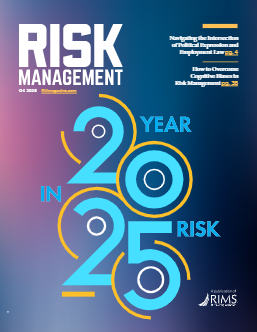State of Mind: The New Landscape of Neural Data Privacy Laws
To manage emerging neural privacy risks, organizations must understand how the legal and regulatory landscape is evolving to create new risks and obligations for protecting individual privacy.
How Should Boards Govern AI and the Next Wave of Technology?
To ensure the organization can capture opportunities and effectively manage related risks, boards must determine how they will govern artificial intelligence, agentic AI and the adoption of other emerging technologies.
4 Steps to Conduct More Valuable Simulated Exercises
Done correctly, simulated exercises inject urgency and realism into continuity planning and crisis preparedness, offering the best chance to test and strengthen business resilience.
Managing Trade Credit Risks Amid Global Economic Uncertainty
Companies that treat trade credit as a managed risk rather than a background function will be best positioned to navigate current and future waves of global uncertainty.
Current Issue

Fourth Quarter 2025
How to Take Control of an Injury Claim
By combining proactive pre-incident measures, timely investigations and thorough documentation, organizations can manage claims efficiently and strengthen safety and risk management practices.
Improving Cyber Governance in a Shifting Regulatory Environment
Uncertainty around the status of the Cybersecurity Information Sharing Act of 2015 has created new legal and operational challenges, requiring risk leaders to address cyber governance gaps.
Criminally Overhyped: The Risks of AI Washing
Businesses that make false claims about their AI capabilities can expose themselves to increased risk of litigation, regulatory scrutiny and other serious consequences.
Mental Health Tops List of Workplace Injuries
Mental health-related injuries are the primary workplace safety concern of small business employees, exceeding traditional worries like physical injuries and environmental hazards.
The Impact of Political Risk Losses
More than half of multinational companies suffered a political risk-related loss to their international investments between 2020 and 2025.
Misdirected Email: The Workplace Faux Pas with a Shocking Price Tag
Misdirected emails are one of the most damaging enterprise cybersecurity threats, often resulting in data breaches, regulatory violations, remediation costs and reputation damage.
The New Face of Fraud: Defending Against the Rising Threat of Deepfakes
AI‑crafted personas that convincingly impersonate employees, partners or executives, allowing attackers to more easily commit fraud, have become a serious business risk.
Year in Risk 2025
Our annual review highlights top challenges risk professionals had to address in 2025 and events that will shape the risk landscape moving into 2026.
Assessing the Risks of Retreating from DEI
As companies consider whether to retreat from or rebrand an organization-wide DEI program, they to assess their risk in four key areas.
The Growing Liability Risk of State False Claims Act Statutes
Organizations that contract with state governments or receive state funds need to ensure they have the procedures in place to reduce the risk of a state FCA enforcement lawsuit alleging false or fraudulent claims.
Financial Violations Make Up Only 7% of Corporate Offenses But 20% of Fines
While financial violations made up only 7% of all fines, they were the most costly, totaling over $69 billion and averaging over $27 million per fine.
Exploring Trade Credit Insurance in Response to Increasing Tariff Risk
Surging an unpredictable U.S. tariff rates have magnified the critical role of trade credit insurance in safeguarding businesses engaged in international trade.
How to Overcome Cognitive Biases in Risk Management
By exploring the most pervasive biases shaping ERM today, risk professionals can better develop pragmatic techniques to counter their effects and limit their impact on business decisions.
AI Maturity Lags Behind AI Adoption
While AI adoption is surging, recent research from Workiva found "most companies lack the foundational infrastructure to scale it safely and effectively."
Beyond the Flood Zone: Why Every Property Owner Should Rethink Flood Risk
As flood risk expands beyond traditionally flood-prone areas and federal disaster support diminishes, property owners need to take proactive steps to reduce their losses.
